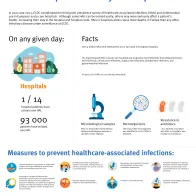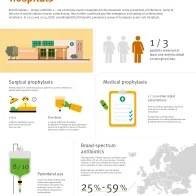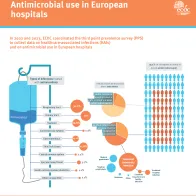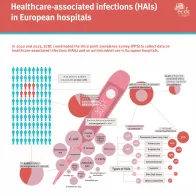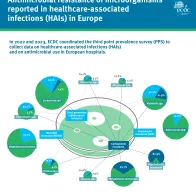Each year, 4.3 million patients in hospitals in the EU/EEA are affected by healthcare-associated infections
“Healthcare-associated infections pose a significant challenge to patient safety in hospitals throughout Europe. These recent numbers highlight the urgent need for further actions to mitigate this threat. By prioritising infection prevention and control policies and practices, as well as antimicrobial stewardship and improving surveillance, we can effectively combat the spread of these infections and protect the health of patients across the EU/EEA,” said Dr Andrea Ammon, ECDC Director.
In 2022-2023, healthcare-associated COVID-19 was a significant contributor to the increased burden of HAIs as compared with the previous PPS in 2016-2017. SARS-CoV-2, the virus responsible for COVID-19, ranked as the fourth most common microorganism in HAIs.
Respiratory tract infections, including pneumonia and healthcare-associated COVID-19, represented nearly one-third of all reported HAIs, followed by urinary tract infections, surgical site infections, bloodstream infections, and gastrointestinal infections.
An increase was also observed for antimicrobial use compared to previous surveys. In the PPS 2022-2023, 35.5% of patients received at least one antimicrobial agent, compared to 32.9% in the previous PPS in 2016-2017. On any given day in the EU/EEA, approximately 390 000 hospitalised patients receive at least one antimicrobial agent. A particular concern is that 1 in 3 microorganisms detected in HAIs were bacteria resistant to important antibiotics, thus limiting options for treating infected patients.
At least 20% of HAIs are deemed preventable by sustained and multifaceted IPC programmes. IPC measures are more effective when they are part of multimodal implementation strategies, combining elements such as education as well as monitoring and feedback.
Simple measures such as hand hygiene and ensuring that alcohol-based hand rub dispensers are available at the bedside, may considerably decrease the number of HAIs. More complex interventions such as ensuring an adequate number of single rooms and specialised IPC personnel, also play a crucial role in preventing HAIs.
However, there was significant variation in the implementation of IPC programmes across European hospitals, indicating the need for standardised practices and enhanced efforts to improve compliance with IPC measures.
The results of the PPS also highlight the importance of implementing preventive measures for respiratory viral infections in healthcare settings. These include early testing for the timely diagnosis of respiratory viral infections followed by the application of transmission-based precautions as well as, during periods of high prevalence of respiratory viral infections in the community, considering universal masking throughout the healthcare setting.
ECDC remains committed to continuing to support the EU/EEA countries to improve their evidence-based response to healthcare-associated infections (HAIs).
Read the report
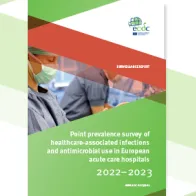
The 2022–2023 ECDC PPS was the third EU-wide point prevalence survey of healthcare-associated infections and antimicrobial use in acute care hospitals.
Point prevalence survey of healthcareassociated infections and antimicrobial use in European acute care hospitals 2022-2023
English (7.18 MB - PDF)Watch the press conference
Infographics
Country factsheets
Share this page


